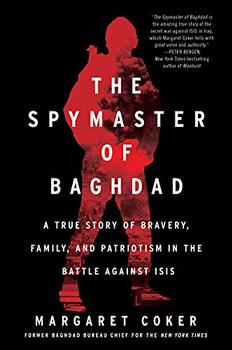Summary | Excerpt | Reading Guide | Reviews | Beyond the Book | Readalikes | Genres & Themes | Author Bio

A True Story of Bravery, Family, and Patriotism in the Battle against ISIS
by Margaret CokerChapter 1
Blessings of an Oldest Child
Harith al-Sudani was born with large brown eyes, a broad forehead, and a weak chin, creating a sense of imbalance. Nothing about his looks or his upbringing in an eastern Baghdad slum would lead anyone to think he would become a hero. Nevertheless, his parents considered him a blessing—the answer to eight long years of prayers for an heir.
From his mother's point of view, Harith was a delight. He was an easy child who was always eager to please. He would fetch things for Um Harith while she was cooking and put his toys away, keeping the house tidy the way she liked it.
But as soon as Harith was walking and talking, his father, Abu Harith, began to worry that his son had little in the way of a backbone. It was unseemly for the oldest son of a father with ambitions like his to be such a mama's boy, motivated by a smile and a hug. In Abu Harith's view, tenderness was as useful as locusts at harvesttime. Moreover, in the Iraq of the early 1980s, it was dangerous.
Abu Harith, thin as a bean stalk and as gritty as the dirt in his father's wheat fields in southern Iraq, resolved early on to toughen up his son. A good father needed to teach obedience and perseverance, the qualities necessary for survival given that the al-Sudanis adhered to the wrong religious tradition, lived in the worst neighborhood, and had no political connections.
As Harith grew, his mother and aunts smothered him with kisses. They compared his light brown curls and sweet smile to those of an angel. But Abu Harith never once showed affection to the boy, not a single hug or pat on the head. When company came over, the patriarch sat in his lacquered wood armchair and lectured on the merits of tough love. A slap on the head if Harith spilled tea on the floor. A whack to his legs from a reed switch if Harith played too loudly. A whipping from the wooden broom kept next to the stove in the kitchen if Harith talked back. If his oldest son could endure what his father inflicted on him, Abu Harith reasoned, he could survive life in Iraq.
Abu Harith's zeal toward discipline wasn't unusual in Iraq. Saddam Hussein controlled the country, but the nation was full of petty dictators. In almost every family the patriarchs ruled with power born from Iraq's deep-seated tribal traditions that thrived on hierarchy and submission. As the eldest man of the extended al-Sudani family, Abu Harith assumed the birthright as patron, status that gave him power over a number of lives—his wife and ten children as well as the families of three of his younger brothers living in Saddam City. Each were honor bound to seek Abu Harith's approval on major decisions in life—whom they wanted to marry, where they wanted to work, and even what their children should study in school. In return, Abu Harith was obliged to arrange for those jobs and help pay for their weddings. And if any family member got into trouble with the police, Abu Harith would have to stand surety in the matter. In all this, Abu Harith harbored a single dream: that his eldest son would lift the al-Sudani family out of poverty.
Harith was, after all, good at schoolwork, so that was half the battle won. The crucial missing link was discipline and fortitude, traits that his father took it upon himself to teach. When the rest of his children misbehaved, Abu Harith rarely struck them. He transferred the punishments to Harith. With the broom in his hand, he would tell the boy what the eldest son of a family was for—to absorb the aches, pains, and worries of the others. Just like Abu Harith had always done.
This was the world that Harith was born into, the world he was meant to inherit, one where it was heroic just to survive a father's tough love, the interference of evil bureaucrats, and the whims of a dictator who saw people like the al-Sudanis as enemies of the state.
Excerpted from The Spymaster of Baghdad by Margaret Coker. Copyright © 2021 by Margaret Coker. Excerpted by permission of Dey Street Books. All rights reserved. No part of this excerpt may be reproduced or reprinted without permission in writing from the publisher.
If there is anything more dangerous to the life of the mind than having no independent commitment to ideas...
Click Here to find out who said this, as well as discovering other famous literary quotes!
Your guide toexceptional books
BookBrowse seeks out and recommends the best in contemporary fiction and nonfiction—books that not only engage and entertain but also deepen our understanding of ourselves and the world around us.